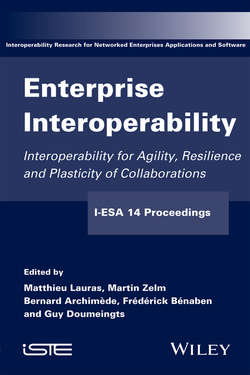Описание книги
Enterprises and organizations of any kind embedded in today's economic environment are deeply dependent on their ability to take part in collaborations. Consequently, it is strongly required for them to get actively involved for their own benefit in emerging, potentially opportunistic collaborative enterprise networks. The concept of “interoperability” has been defined by INTEROP-VLab as “The ability of an enterprise system or application to interact with others at a low cost in a flexible approach”. Consequently, interoperability of organizations appears as a major issue to succeed in building on the fly emerging enterprise networks. The International Conference on Interoperability for Enterprise Systems and Applications (I-ESA 2014) was held under the motto “interoperability for agility, resilience and plasticity of collaborations” on March 26-28, 2014 and organized by the Ecole des Mines d’Albi-Carmaux, France on behalf of the European Laboratory for Enterprise Interoperability (INTEROP-VLab). On March 24-25, co-located with the conference eight workshops and one doctoral symposium were held in four tracks complementing the program of the I-ESA’14 conference. The workshops and the doctoral symposium address areas of greatest current activity focusing on active discussions among the leading researchers in the area of Enterprise Interoperability. This part of the conference helps the community to operate effectively, building co-operative and supportive international links as well as providing new knowledge of on-going research to practitioners. The workshops and doctoral symposium aimed at exploiting new issues, challenges and solutions for Enterprise Interoperability (EI) and associated domains of innovation such as Smart Industry, Internet-Of-Things, Factories of the Future, EI Applications and Standardisation. These proceedings include the short papers from the I-ESA’14 workshops and the doctoral symposium. The book is split up into 9 sections, one for each workshop and one for the doctoral symposium. All sections were organized following four tracks: (1) EI and Future Internet / Factory of the Future; (2) EI Application Domains and IT; (3) EI Standards; (4) EI Doctoral Symposium. For each section, a workshop report is provided summarizing the content and the issues discussed during the sessions. The goal of the first track was to offer a discussion opportunity on interoperability issues regarding the use of Internet of Things on manufacturing environment (Workshops 1 and 3) on one hand, and regarding the potential of innovation derived from the use of digital methods, architectures and services such as Smart Networks (Workshops 2 and 4) on the other hand. The second track focused on particular application domains that are looking for innovative solutions to support their strong collaborative needs. Thus, the track developed one workshop on the use of EI solution for Future City-Logistics (Workshop 5) and one on the use of EI solutions for Crisis / Disaster Management (Workshop 6). The third track studied the recent developments in EI standardization. Two workshops were dedicated to this issue. The first one has proposed to focus on the management of standardization (Workshop 8) and the second one has chosen to work on the new knowledge on standardization developments in the manufacturing service domain (Workshop 9). The last track, the doctoral symposium presented research results from selected dissertations. The session discussed EI knowledge issues, notably in terms of gathering through social networks or Internet of Things and of exploitation through innovative decision support systems.
